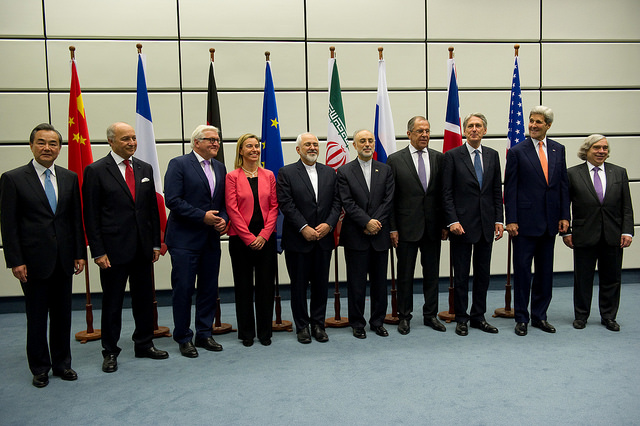Iran, Sanctions, and the Illusion of a Better Bargain
Even the most vehement critics of the Obama administration’s agreement curbing Iran’s nuclear capabilities, among them Israeli Prime Minister Benjamin Netanyahu and Senator Tom Cotton, no longer advance the military option for eliminating Iran’s nuclear infrastructure. Instead, they argue that a better bargain could have been negotiated, if the Obama administration had not “given away” the leverage awarded by comprehensive economic sanctions.

Published by The Lawfare Institute
in Cooperation With

Even the most vehement critics of the Obama administration’s agreement curbing Iran’s nuclear capabilities, among them Israeli Prime Minister Benjamin Netanyahu and Senator Tom Cotton, no longer advance the military option for eliminating Iran’s nuclear infrastructure. Instead, they argue that a better bargain could have been negotiated, if the Obama administration had not “given away” the leverage awarded by comprehensive economic sanctions. Given Iran’s economic disarray, maintenance or tightening of the sanctions would have eventually forced the Iranian government to accept much tougher limits on its nuclear programs or even their complete dismantling.
These arguments sidestep the multilateral character of the sanctions imposed on Iran and the asymmetry in costs borne by the other members of the P5+1. Each of those negotiating partners—three European allies, Russia, and China—paid a higher economic price for these economic sanctions in trade and investment foregone than the United States, whose companies have had (and will continue to have) limited economic exchange with Iran since the revolution, prevented by layers of unilateral sanctions imposed by successive U. S. administrations. Without the support of its negotiating partners for extending or deepening sanctions, their effectiveness would be immediately undermined. Given the greater opportunity cost of sanctions for them—particularly for Russia and China—it is difficult to imagine that they would follow any U.S. pursuit of a tougher bargain. Thus, the deal that is on the table represents not only a bargain between the P5+1 and Iran, but also a bargain among the P5+1 partners themselves.
Even if multilateral sanctions could be extended in time or reinforced, Iran’s domestic politics would present even larger obstacles to their effectiveness. Critics of the current agreement implicitly endorse a simple model of sanctions effectiveness: economic sanctions create economic hardship for the Iranian population; the threat of discontent among the population then forces the Iranian regime to concede its nuclear program. (Note that the critics also implicitly accept that this demonized authoritarian regime is responsive to popular discontent.) The election of President Hassan Rouhani in 2013 undoubtedly signaled popular discontent with Iran’s international isolation and economic performance. Although we will never know the calculations of Supreme Leader Khamenei, the vote for Rouhani probably played a role in accelerating the nuclear negotiations. In this respect, Iran differs dramatically from North Korea, where comprehensive sanctions imposed by the United States and the United Nations have been notably unsuccessful in changing the nuclear ambitions of the regime.
Iranian domestic politics may have promoted a willingness to accept the current agreement, but those politics also set three limits to a strategy of turning the sanctions screws further in an effort to obtain a more favorable outcome. First, even though the Iranian population may weight an end to Iran’s economic isolation differently than its leadership, widespread support exists for a national nuclear program. A 2014 joint U.S.-Iranian survey confirmed that the Iranian public is nearly unanimous in its belief that Iran must have a nuclear energy program and backed specific “red lines” regarding acceptable concessions, including (by large majorities) dismantling existing centrifuges or imposing limits on nuclear research. Although those surveyed fully comprehended the costs of sanctions and wished to have them removed, their view of the Iranian economy was far from catastrophic. In other words, hoping that a tightening of economic screws on Iran will produce more public discontent and force further concessions is not supported by the data: such an approach is more likely to drive the government and the public closer together in resisting what is perceived as U.S. pressure on a legitimate nuclear program. Iran’s insistence on the right to a peaceful nuclear program is shared by other emerging powers, including those that have given up nuclear weapons programs, such as Brazil and South Africa.
Second, the Iranian regime may actually welcome an effort to tighten sanctions if the current bargain is overturned. Economic sanctions can produce a “rally round the flag” effect that temporarily buoys the targeted regime. The Putin government’s response to U.S. and European sanctions demonstrate the appeal of this effect. But sanctions are equally valuable for blame shifting: economic mismanagement can be attributed to hostile outside powers. Once again, the risk of unifying regime and population increases.
Although responsive to its public, the Iranian regime is authoritarian and repressive: over time, it can shift even more of the burden of sanctions away from core regime supporters and on to the population at large. Its lack of transparency would make this task even easier. A third consequence of extended or intensified sanctions is a “friends get benefits” effect: sanctions-induced scarcity produces rents that flow to the politically connected—hardline hawks in the Revolutionary Guards Corps and others with political clout. President Obama mentioned this effect in his interview with Thomas Friedman. The result would be a replay of the classic alliance between “Baptists and bootleggers”: our hawks tighten the screws and their hawks benefit.
Calculating the effects of tightening sanctions or removing them is uncertain: weighing each of these distinct effects over time is complex and imprecise. At this point in time, given the current Iranian leadership, the state of Iranian public opinion, and Iranian economic conditions, relying on unilateral economic leverage to obtain a better deal is an illusion. More likely it would drive Iran further in the direction of North Korea—an unrestrained nuclear program and an economically isolated, unreformed regime.


.png?sfvrsn=aed44e61_5)
.jpg?sfvrsn=564b5f50_5)
